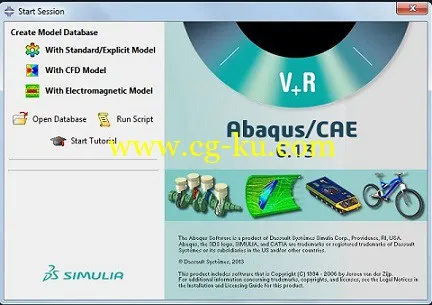
这是一个强大而完整的虚拟仿真测试解决方案,有助于缩短产品开发时间和降低产品开发成本,同时提高可靠性。新版Abaqus提供了新功能,增强了多物理场、建模与网格划分性能。
ABAQUS
6.13提供SIMULIA战略提供可扩展的,高品质的新功能和100多名客户要求的增强逼真的模拟解决方案的承诺。 SIMULIA客户在广泛的行业 - 包括航空航天,汽车,消费品,能源和生命科学 - 使用Abaqus的探索真实世界的物理行为,产品和材料,以提高性能,可靠性和安全性,同时减少开发时间和成本。
Abaqus 6.13的主要特点:
Multiphysics的
磁响应
:静磁场分析计算磁场的由于直接电流分配到一个已知的支持。 这种能力可以用来模拟常见的电气设备,如磁性记录设备。
非线性粘弹性
:改进与实验数据相匹配,现在可以使用基于并行网络方法的非线性粘。 此增强功能是在涉及高分子材料在汽车和生命科学产业的应用中特别有用。
光滑粒子动力学(SPH):ABAQUS
提供了一个新功能,允许常规元素被转换成颗粒飞根据用户定义的标准,它引入了一套全新的工作流程在Abaqus进行。
多孔介质流量
:Abaqus的现在支持建模的流体流过的纤维类型的过滤器,如通过土壤或纸过滤器渗水。 流体饱和多孔介质流经发生在广泛的工业和环境的应用,如填充床换热器,热管,保温,油气藏,核废物处置库,地热工程,热管理,电子设备,金属合金铸造,以及在生物反应器流过的多孔支架。
非牛顿粘度
:许多工业,技术和生物学意义,如泡沫,乳液,分散液和悬浮液,泥浆,血,和聚合物熔体,流体的非牛顿性质的。 涉及这样的流体的流量的模拟,现在可以实现在Abaqus开发使用非牛顿流体模型,从而提高了产品的功能性的覆盖范围。
建模和网格
网格几何:
现在可以被转换成几何网格零件。 此增强功能是创建几何变形的网格,如支架,车辆内侧的内部的声学腔体,以及一些其他的行业应用非常有用。
现在可以生成
边界层网格划分:
楔形元件沿着选定的一部分或一个单元格的边界,并与四面体单元的内部填充。 沿着墙壁的小元素的添加层可以提高分析流体流动与传热分析的边界效应。
混合建模:
其他几何建模的灵活性,本地人,和孤儿网格共存于同一空间。
节点拖动
节点可以被重新定位为一个新的“拖曳”功能。
ABAQUS /
ABAQUS /浏览器
浏览器:
可视化的功能已经扩展到可视化预处理实体建模,如相互作用,预先定义的领域,载荷多。
性能
AMS基于子结构生成
一个新的子结构发电能力AMS特征值求解提供显着的性能改进和子结构生成的Abaqus 6.13减少磁盘空间的要求。举一个例子,进行频率分析,并生成一个子结构动力总成模型拥有1300万个自由度(DOF),使用AMS特征值求解ABAQUS 6.13只需要不到4个小时,至17小时,在以前的版本比较。
VCCT增强功能
:改善性能和鲁棒性,虚拟裂纹闭合技术(VCCT)在ABAQUS /标准,它允许分层复合材料结构进行建模更加迅速。
联系和约束:6.13
ABAQUS提供边功能增强,为更好的操控性之间的接触边缘和表面,这是宝贵的广泛的应用,例如,电气连接。
自适应网格加密为CEL:
提高耦合欧拉-拉格朗日(CEL)的自适应网格细化模型中,存在较大的变形,如安全气囊,自动细化网格需要在Abaqus的性能。
直接稀疏求解器使用多个通用图形处理器(GPGPU):
支持多GPU的直接稀疏求解器提供更快的多GPU卡的计算机上执行。
附加组件
CATIA V6联想接口:
的CATIA V6 AI提供一键式的选项,轻松地将零件或装配体模型的Abaqus / CAE,而保留的Abaqus / CAE中定义的属性,在重新导入几何从CATIA V6。
翻译改进
现有fromnastran和fromansys翻译新的鲁棒性,功能性和诊断ANSYS和NASTRAN,Abaqus的客户感动,以支持日益增长的兴趣增强。 此外,一个新的fromdyna的译者是DYNA模型转换到ABAQUS。 重点放在显着的性能和易于使用,这将允许用户快速转换大的模型,用尽可能少的人工干预可能。 在一个例子中,有超过6万个节点的SUV车型在12秒内被翻译超过99%的数据翻译。
Simulia Abaqus 6.13.1 64Bit | 1.7 GB
Abaqus 6.13
Abaqus 6.13 delivers on SIMULIA's strategic commitment to provide scalable, high-quality realistic simulation solutions with new capabilities and more than 100 customer-requested enhancements. SIMULIA customers in a wide range of industries — including aerospace, automotive, consumer packaged goods, energy and life sciences — are using Abaqus to explore the real-world physical behavior of products and materials, in order to improve performance, reliability and safety, while reducing development time and costs.
Key Features of Abaqus 6.13
Multiphysics
Magnetostatic Response
: Magnetostatic analysis support to compute the magnetic field due to a known distribution of direct current. This capability can be used to model common electric devices such as magnetic recording devices.
Nonlinear Viscoelasticity
: Improved matches with experimental data are now possible using nonlinear viscoelasticity based on the parallel network approach. This enhancement is particularly useful in applications involving polymer materials in the automotive and life science industries.
Smoothed Particle Hydrodynamics (SPH):
Abaqus provides a new capability that allows conventional elements to be converted into particles on-the-fly based on user defined criteria, which introduces an entirely new set of workflows to be performed in Abaqus.
Porous Media Flow
: Abaqus now supports the modeling of fluid flow through a fibrous type of filter, such as water seeping through soil or a paper filter. Flows through fluid-saturated porous media occur in a wide range of industrial and environmental applications, such as packed-bed heat exchangers, heat pipes, thermal insulation, petroleum reservoirs, nuclear waste repositories, geothermal engineering, thermal management of electronic devices, metal alloy casting, and flow past porous scaffolds in bioreactors.
Non-Newtonian Viscosity
: Many fluids of industrial, technological, and biological significance, such as foams, emulsions, dispersions and suspensions, slurries, blood, and polymeric melts, are non-Newtonian in nature. Simulation of flows involving such fluids can now be achieved using the non-Newtonian models developed in Abaqus, thereby increasing the coverage of the product functionality.
Modeling and meshing
Mesh-to-Geometry:
Mesh parts can now be converted into geometry. This enhancement is useful for creating geometry from deformed meshes, such as a stent, creating an interior acoustic cavity inside of a vehicle, as well as a number of other industry applications.
Boundary Layer Meshing:
Wedge elements can now be generated along selected boundaries of a part or a cell, and the interior is filled with tetrahedral elements. Adding layers of small elements along the walls allows improved analysis of boundary effects in fluid flow and heat transfer analyses.
Hybrid Modeling:
Additional modeling flexibility for geometry, native, and orphan meshes to co-exist in the same space.
Node Dragging:
Nodes can be repositioned with a new “dragging” feature.
Abaqus/Viewer:
Visualization functionality in Abaqus/Viewer has been extended to visualize preprocessing modeling entities, such as interactions, pre-defined fields, loads and more.
Performance
AMS-based Substructure Generation:
A new substructure generation capability in the AMS eigensolver delivers significant performance improvements and reduces disk space requirements for substructure generation in Abaqus 6.13. In one example, performing a frequency analysis and generating a substructure for a powertrain model with 13 million degrees of freedom (DOF) using the AMS eigensolver in Abaqus 6.13 only takes less than four hours, compared to 17 hours in previous versions.
VCCT Enhancements
: Performance and robustness improvements were made to the Virtual Crack Closure Technique (VCCT) in Abaqus/Standard, which allows the delamination of composite structures to be modeled much more quickly.
Contact and Constraints:
Abaqus 6.13 offers edge-to-feature enhancements for better handling of contact between edges and surfaces, which is valuable in a broad range of applications, for example, electrical connections.
Adaptive Mesh Refinement for CEL:
The adaptive mesh refinement for Coupled Eulerian Lagrangian (CEL) improves performance in models in which large deformation exists, such as airbag deployment, by automatically refining the mesh as needed in Abaqus.
Direct Sparse Solver using Multiple GPGPUs:
Support for multiple GPUs in the direct sparse solver provides faster execution on computers with multiple GPU cards.
Add-ons
CATIA V6 Associative Interface:
The CATIA V6 AI provides a one-click option to easily transfer part or assembly models to Abaqus/CAE, while retaining the attributes defined in Abaqus/CAE during the re-import of geometry from CATIA V6.
Translator Improvements:
The existing fromnastran and fromansys translators were enhanced with new robustness, functionality, and diagnostics to support the growing interest in customers moving from ANSYS and NASTRAN to Abaqus. Also, a new fromdyna translator is available to convert DYNA models into Abaqus. Significant focus was placed on performance and ease-of-use, which will allow users to quickly translate large models with as little manual intervention as possible. In one example, an SUV model with over 6 million nodes was translated in 12 seconds with over 99% of the data translated.
System requirements: Windows 64-bit
Home Page :
http://www.simulia.com
解压密码:www.cg-ku.com
Download filefactory
http://www.filefactory.com/file/65cx241x7ceh/n/ABAQUS_6.13.1_Win64_SSQ.part1.rar
http://www.filefactory.com/file/52sh6m1in03b/n/ABAQUS_6.13.1_Win64_SSQ.part2.rar
http://www.filefactory.com/file/oogw37r1vpv/n/ABAQUS_6.13.1_Win64_SSQ.part3.rar
http://www.filefactory.com/file/680fgf3bq5g5/n/ABAQUS_6.13.1_Win64_SSQ.part4.rar
发布日期: 2013-07-18